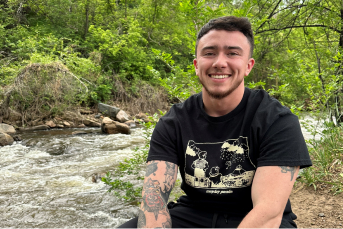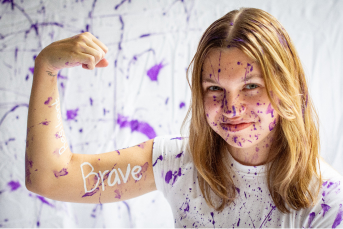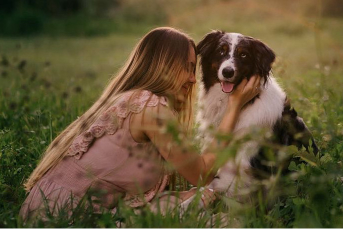Having a seizure alert dog
I really enjoy animals. I have two cats, and trained my own seizure alert dog, Bert. The difficulty with service dogs is that they're often inaccessible for people without the money for services. For someone not yet approved for disability, I needed to ‘owner train’. I went through a non-profit, we worked together 1-1 for 3 years.
I don't have an aura before a seizure, I will feel weird but I can't connect it with an oncoming seizure. So I can't prepare. Bert (my seizure dog) knows when a seizure is going to happen. He'll put his feet on my chest or he'll stand up to get me to sit.
His behavior will change to make sure I'm prepared. He'll stay by my side until it happens. If it's a grand mal (tonic clonic seizure). He will make sure that I'm kept aware - e.g. by licking my face. When it's over he'll lie beside me and we'll fall asleep together. I LOVE living on my own for the most part, feeling independent is great. But when my seizures act up, things can get scary because there's the huge unknown factor. Without Bert living on my own wouldn't be possible.

Kenzie’s epilepsy story
My epilepsy is genetic from my father, he also has seizures. When I was born I suffered birth trauma, I came out unresponsive and not breathing. I was without oxygen for 5-6 minutes. I had my first seizure at 18 months, but I wasn't diagnosed and didn’t have problems until I was 16. Then I was put on meds, everything was going well, between 17-22 my seizures were controlled.
I thought I could live a normal life with some precautions, and wasn't too aware of my epilepsy. I went to a concert with a friend and had my first status epilepticus, I was put in an induced coma. From 22 to 27 I have been in 6 induced comas due to my seizures. I have now found out that I have photosensitive epilepsy.
Learn more: What is photosensitive epilepsy?
Going through high school with epilepsy
In high school I had some issues, I had plans in place with my teachers about what to do when they came up. I couldn't go to college because that's the time when things flared up. I was diagnosed at 16, which meant I was unable to take a driver’s test, I pretty much had to skip that part of my life.
What helped me get through it, driving particularly, is that I look at things in a different way. At 16 friends were pressured into early adulthood to drive, work, but for me it was a blessing in disguise, because I wasn't rushed into things. It allows me to slow down and appreciate other aspects of life.
Finding community after diagnosis
Facebook has a lot of great epilepsy groups that I'm part of, it's incredible because they are huge with people all across the world. There's so much community there. I've met people in person and it's been great.
Read more: Finding epilepsy support groups
Experience with the Epsy App
Originally everything flared up when I was 22, I didn't know how to manage any of this stuff on my own. But I didn't want a bunch of other people checking up on me. Epsy looked great and had the best reviews. I love the design and accessibility, everything is so simple. I use it to manage my meds, as soon as I take it I log it immediately. It’s a life changing and lifesaving app - an incredible resource to have.
Epsy gives people with epilepsy a sense of independence at any stage of their diagnosis. The app is for me and made for people like me. I'm not powerless, it gives users a sense of empowerment in what epilepsy has to give. Whenever I'm at a doctor's appointment, or when 911 gets called the first thing is 'what's my meds list'. I go to Epsy and show them that. It's such an easier way to speak to a doctor. It saves them time, so they love it.
The journey with neurologists
This is a huge thing. I started my journey in California. Every neurologist was constantly writing off my seizures as a mental health problem. I’d be told ‘you just need to relax’, I didn't agree. It was difficult to be understood and validated by the medical community.
Medical gaslighting is a big thing, being told you are 'just faking your seizures' - it was hard to feel like I had to be persistent to get my medical needs met. When I was at the epilepsy monitoring unit, it's so exhausting and a struggle both physically and emotionally. It was frustrating when seizures weren't caught and I'd be sent home. Then 2 weeks later I'd have another status epilepticus episode.
The biggest thing I have learned is that when one doctor doesn't agree or doesn't treat you right, it's worthwhile to seek out a different resource and move on. Even though I'm not aware of my seizures, I know I have epilepsy. I don't need to waste my time with a doctor who won't listen to me.
Be prepared: 15 questions to ask your neurologist
Advice to a younger you
I have ‘seize the day’ tattooed on my bicep. That's what I tell myself, it allows me to turn the word into a positive. If I have one or even ten seizures, I can make the most of this day regardless. I always try to tell myself I won't approach my day with any fear. When things get bad medically, I always come out of it. The beauty of the human body is that it's strong, we're amazingly strong people with epilepsy. Just never give up.
Goals for the future
I don't like to aim low. I am a performer. When this all started I had to step out of that field, one goal is once I can get myself under control I can begin performing again. And make it a more accessible field, to help people experience these things. I'm also a writer, and have a few books and poetry I want to publish.

















